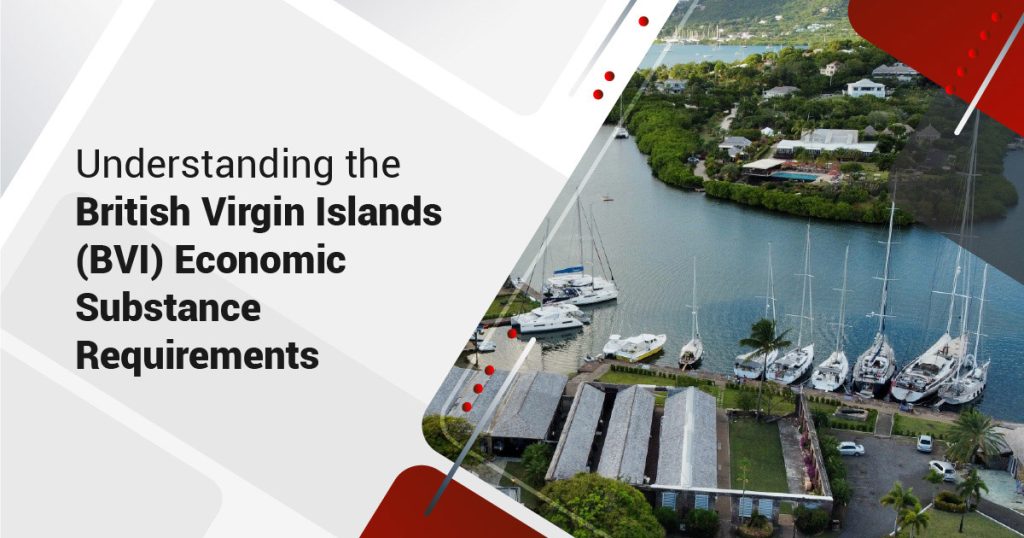The British Virgin Islands (BVI) has long been a popular destination for international investments, thanks to its favourable tax regime and flexible corporate structures.

However, similar to the Cayman Islands, the BVI has introduced economic substance requirements to align with global standards and enhance its international standing as a reputable investment destination. Given the increasing scrutiny from international watchdogs, these requirements are of significant importance.
This article aims to provide directors and operators of BVI companies and limited partnerships with a comprehensive overview of these requirements, covering the legal framework, relevant entities and activities, tax residence requirements, specific substance requirements, outsourcing, and enforcement.
By the end of this guide, you will have a clear understanding of what is required to ensure your business meets these important standards when operating in the BVI.
BVI Economic Substance Legal Framework
The Economic Substance (Companies and Limited Partnerships) Act, 2018, and its amendment in 2021 were introduced to address international concerns about tax evasion and to align the BVI with global standards set by international bodies such as the EU Code of Conduct Group and the OECD Forum on Harmful Tax Practices.
Under this legislation, companies and limited partnerships must demonstrate a genuine economic presence, which involves operating core income-generating activities (CIGA) from within the BVI.
Beyond the legislative aspects, with a growing emphasis on the social and governance aspects of ESG in the investment sector, the introduction of these laws reflects the BVI’s ongoing commitment to enhancing its reputation as a reputable financial centre.
BVI Economic Substance Relevant Entities
Economic substance requirements in the BVI apply to all companies and limited partnerships registered or incorporated in the jurisdiction.
The economic substance requirements do not apply to:
- Trusts
- General Partnerships
Each entity must conduct an annual review covering three key areas:
- Relevant Activities: Assess if the entity has carried on any relevant activity.
- Tax Residency: Determine where the entity is tax resident.
- Substance Requirements: Evaluate if the entity needs to demonstrate substance in the BVI.
The results of this annual review should be documented and provided to the entity’s registered agent, who will then file the annual economic substance declaration on behalf of the entity.
BVI Economic Substance Relevant Activities
Entities in the BVI must comply with economic substance requirements if they engage in any of the following relevant activities:
- Insurance
- Banking Business
- Headquarters
- Shipping
- Intellectual Property Business
- Finance and Leasing
- Fund Management Business
- Holding Business
- Distribution and Service Centre Business
Investment fund businesses are not considered relevant activities under the Act.
BVI Economic Substance Tax Residence Requirements
In the BVI, every entity must submit an annual declaration regardless of where it is a tax resident. However, the specific requirements differ based on whether the entity has engaged in any relevant activities and its tax residency status.
- Entities with No Relevant Activity: For those that did not carry on any relevant activities during the year, compliance is straightforward. They can submit a ‘nil return’ declaration to meet their economic substance obligations.
- Entities with Relevant Activity: Entities that have engaged in relevant activities face more detailed requirements. They must:
- Confirm the relevant activities conducted.
- Either demonstrate sufficient economic substance within the BVI or prove tax residency in a cooperative jurisdiction (a jurisdiction that is not blacklisted by the EU for tax purposes).
To prove tax residency in a cooperative jurisdiction, an entity must submit a foreign tax certificate or an equivalent document.
To demonstrate substance within the BVI, an entity:
- Must show it has enough employees in the BVI.
- Must maintain proper premises in the BVI.
- May have to prove that its management and control are based in the BVI.
- May have to incur adequate expenditures locally.
- May have to conduct core income-generating activities (CIGA) within the BVI.
These measures ensure that the entity is genuinely operating from the BVI rather than just taking advantage of its favourable tax regime.
BVI Economic Substance Requirements

Entities in the BVI must meet specific economic substance requirements based on their activities and tax residency status. The requirements vary depending on whether the entity conducted any relevant activities and where it is a tax resident.
Relevant Activity
Entities that have conducted relevant activities must submit an annual declaration confirming the activities undertaken. The requirements to satisfy economic substance depend on the entity’s tax residency:
- Tax Resident in a Cooperative Jurisdiction:
- The annual declaration must confirm the entity’s tax residency with a supporting tax certificate.
- Provide information about the parent entity, including its name, incorporation number, and jurisdiction.
- Not Tax Resident in a Cooperative Jurisdiction:
- Demonstrate substance in the entity:
- Must prove an adequate number of suitably qualified employees physically present in the BVI.
- Must have maintained appropriate premises in the BVI.
- May have to prove management and control of the relevant activity from the BVI.
- May have to prove adequate expenditure incurred in the BVI.
- May have to prove core income-generating activities (CIGA) carried out in the BVI.
- Demonstrate substance in the entity:
Entities conducting intellectual property (IP) business must meet additional enhanced economic substance requirements. The terms “appropriate” and “adequate” are of course, subjective, and depend on the nature and scale of the relevant activity and the entity’s general business activities.
For pure equity-holding entities (PEHE) engaged in holding business, compliance can typically be demonstrated by maintaining a registered agent and registered office in the BVI. PEHEs do not need to show that their holding business was managed and directed from the BVI, that they incurred adequate expenditure in the BVI, or that they carried out CIGA in the BVI.
Outsourcing Concerning BVI Economic Substance
When an entity in the BVI outsources part of its operations and relevant activities to a third party, specific requirements must be met and reported in the annual declaration. These requirements ensure that the entity maintains oversight and control over the outsourced activities.
The annual declaration must include:
- Name of the Outsourced Entity:
- Identify the third party that carries out the core income-generating activities (CIGA) on behalf of the entity.
- Activities Performed by the Outsourced Entity:
- Detail what specific activities are carried out by the outsourced entity.
- Proportion of Income-Generating Activities:
- Specify what proportion of the entity’s total income-generating activities is conducted by the outsourced entity.
- Geographical Location:
- State where the outsourced activities are geographically carried out.
- Monitoring and Control:
- Explain how the entity monitors and controls the relevant activities performed by the outsourced entity.
- Resource Utilisation:
- Describe how the resources employed by the outsourced entity are used to perform the relevant activities.
When assessing the adequacy of the entity’s expenditure and employees in the BVI, any work performed by the outsourced entity will be considered. However, certain conditions must be met:
- No CIGA Outside the BVI:
- Core income-generating activities must not be carried out outside the BVI.
- Monitoring and Control:
- The entity must be able to effectively monitor and control the outsourced entity’s activities.
- Income Attribution:
- Only activities conducted by the outsourced entity that directly contribute to generating income for the entity will be considered when assessing compliance with economic substance requirements.
These measures ensure that even when outsourcing, entities maintain a genuine economic presence in the BVI and comply with local regulations.
Related Read: British Virgin Islands Offshore Company Registration
Enforcement and Compliance
The enforcement of economic substance requirements in the BVI is overseen by the International Tax Authority (ITA). This authority plays a crucial role in ensuring that entities comply with the Substance Legislation by reviewing annual declarations and all supporting documents, including tax certificates.
Enforcement Authorities
- International Tax Authority (ITA):
- The ITA is responsible for the enforcement of economic substance requirements.
- It reviews annual declarations and supporting documents submitted by entities.
Information-Gathering Powers (ITA)
The ITA has extensive information-gathering powers to ensure compliance:
- Review Period:
- The ITA has six years to issue a determination if an entity has not complied with its economic substance requirements.
- Determination Process:
- If the ITA finds that an entity has not met its obligations, it will issue a determination specifying:
- The reasons for the non-compliance.
- Any penalties imposed.
- The actions required to bring the entity into compliance.
- If the ITA finds that an entity has not met its obligations, it will issue a determination specifying:
- Second Determination:
- If the entity fails to comply with the initial determination, the ITA will issue a second determination, reiterating the compliance requirements and potentially increasing penalties.
Where to Next With InCorp
Understanding the economic substance requirements in the British Virgin Islands is crucial for ensuring your business complies with local regulations. These laws, while stricter than before, enhance the BVI’s reputation as a transparent and reputable financial centre. By adhering to these requirements, your entity can benefit from the BVI’s still-favourable investment climate while meeting global standards.
The complexities of economic substance legislation can of course, be challenging. Having a trusted and experienced partner like InCorp is therefore essential. InCorp’s expertise in BVI regulations ensures compliance and optimises your business operations — our team provides tailored guidance, helping you understand specific requirements and maintain proper documentation.
Partnering with InCorp means having a dedicated partner committed to your success, offering comprehensive support and proactive compliance management. Contact InCorp today for more insights on entering the BVI market and complying with economic substance laws.
FAQs about Economic Substance in the BVI
What is the Economic Substance Act in the BVI?
- The Economic Substance (Companies and Limited Partnerships) Act, 2018, mandates that companies and limited partnerships in the BVI must demonstrate substantial business activities within the jurisdiction. This includes conducting core income-generating activities (CIGA) from within the BVI.
Who needs to comply with the BVI economic substance requirements?
- All companies and limited partnerships registered or incorporated in the BVI must comply with the economic substance requirements, except for trusts and general partnerships.
What happens if an entity does not comply with the economic substance requirements in the BVI?
- Non-compliance can result in significant penalties. The International Tax Authority (ITA) can issue determinations specifying non-compliance, impose penalties, and outline actions required to achieve compliance. Failure to comply may result in increased penalties and further enforcement actions.



